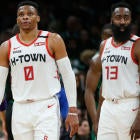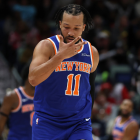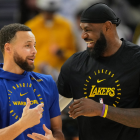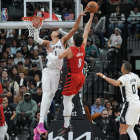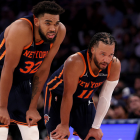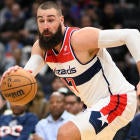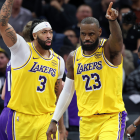The prevailing memory from Game 7 of the 2018 Western Conference Finals will always be the Houston Rockets 27 consecutive shots from behind the arc for a stretch that spanned the middle of the second quarter through nearly the end of the game, but far less recognized is the 6-for-13 hot streak that preceded it. The Rockets held a 14-point lead when Eric Gordon sank what was ultimately Houston's second-to-last 3-pointer of the season. For a quarter and a half, the Rockets lived by the 3. For the rest of the game, they died by it.
The secret behind Houston's success over the past decade has been the recognition that accepting the latter is the inevitability that comes with benefiting from the former. Shooting is unpredictable, but losing isn't. Every season ends the same way, with 29 teams not being named the champion. The odds overwhelmingly favor a given team ending up in that camp, so Houston embraces the risks that come with shooting. If you happen to go 0 for 27, you wind up in the non-champion camp you were destined for anyway. But hit 6 of 13 3s enough times and those first-half leads against superior teams turn into wins. If the 2018 Warriors are vulnerable to shooting variance, then anyone is. Outsmarting the best teams is far easier than beating them at their own game.
So the Rockets bake that variance into their rosters. They've led the NBA in 3-point attempts four seasons in a row and in six of the past seven, often by comical margins. The trouble they've encountered is that a seven-game series presents a long enough sample size that something like an 0-for-27 stretch tends to present itself at inopportune times. James Harden shot 2 of 9 from behind the arc in a season-ending loss the Spurs in 2017. The Rockets shot a combined 10 of 49 in Games 3 and 5 of the 2015 Western Conference Finals.
So they tried to tilt the numbers in their favor this season by committing even more to shooting. They swapped Clint Capela for Robert Covington, eschewing the center position entirely. The more shooting on the floor, the less likely it is that all of them go cold at the same time, and the more space their ball-handlers have to supplement those jumpers with drives to the basket. Whether or not it would have worked remains to be seen, but history hasn't exactly been in their favor. They attempted 52 more 3-pointers than the Warriors in the 2018 Western Conference Finals, 60 more than them in their rematch last season and 98 more than the Spurs in the second round of the 2017 postseason. They lost all three series. Most of the time, the better team wins over the course of seven games, not the smarter one.
But at the moment, the idea of four rounds of seven-game series seems nearly impossible. Nobody knows what sort of postseason the NBA might be able to cobble together, but reports increasingly suggest that it is going to be truncated in some meaningful way. A favorite might not have seven games to put the Rockets away. It might have five. Or three.
In such a scenario the variance that defines the Rockets becomes increasingly dangerous. In Game 1 of that 2017 Spurs series, the Rockets shot 22 of 50 from behind the arc. Against the Warriors in 2018, they shot 16 of 42 in Game 2. In a normal year, such outbursts could be brushed aside as outliers. If playoff series are reduced to best-of-three, such a night pushes the Rockets halfway to an upset. A few of them could carry them all the way to a championship.
And the structure on which this entire organization is built may be based on that sort of success. Mike D'Antoni's contract expires at the end of this season, and reports have suggested that he needs a championship in order to keep his job. While general manager Daryl Morey's job may not be in such immediate danger, his place in Houston has never seemed so precarious. It was his tweet about Hong Kong that lost the NBA millions of dollars of revenue from China, and should he fail to put a champion on the floor this season, his odds don't exactly increase moving forward.
Houston owes over $300 million over the next three seasons to three guards that are all over 30. They are almost certain to pay the luxury tax next season barring a move that makes them tangibly worse. The defensive linchpin on which their entire system is based, P.J. Tucker, turns 35 next month and is on an expiring contract. They control only two of their next seven first-round picks, neither of which is currently tradeable. The Rockets have spent years borrowing against their future to improve their present. They've now maxed out their credit.
Houston's window is rapidly closing, and when it shuts, the entire organization is going to look different. That probably includes the analytically-driven playing style that has defined it since Morey took over the team, and yet, if the season does resume at some point, circumstances may accidentally allow it to do so in a way that gives Houston a golden opportunity to justify that style in the first place.
No team faces a wider range of potential outcomes entering a potentially-shortened postseason than the Rockets. They could be unlikely champions just as easily as a humiliating first-round exit could push them down the road to a rebuild. But Houston's entire organizational philosophy is based on wide variance. Why should this postseason be any different?








